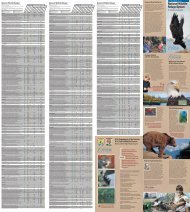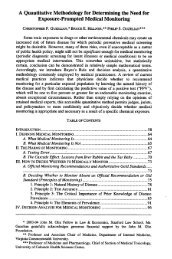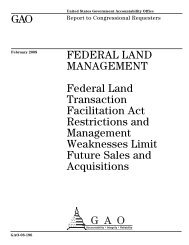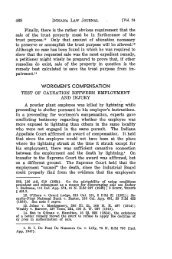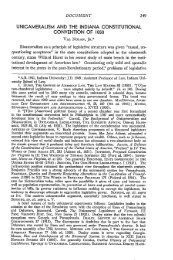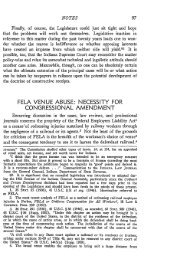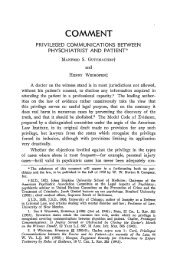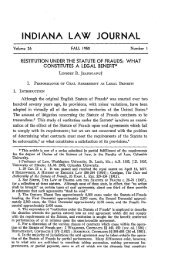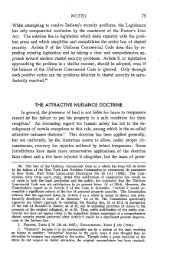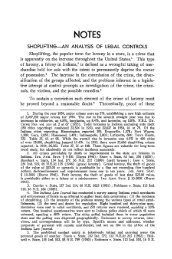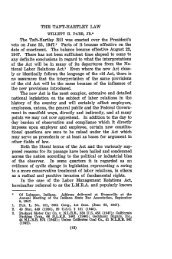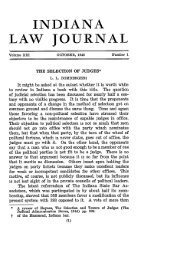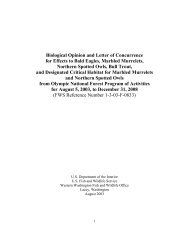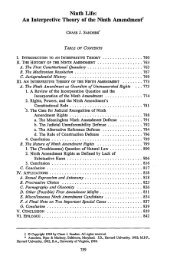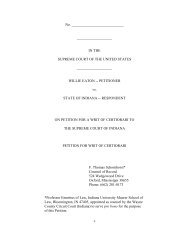constitutional aspects of state extradition legislation - Indiana Law ...
constitutional aspects of state extradition legislation - Indiana Law ...
constitutional aspects of state extradition legislation - Indiana Law ...
Create successful ePaper yourself
Turn your PDF publications into a flip-book with our unique Google optimized e-Paper software.
NOTES<br />
mitted to demand the fugitive's return by the executive authority <strong>of</strong> the<br />
asylum <strong>state</strong>. In addition, the alleged fugitive must have been charged<br />
with a crime in the demanding <strong>state</strong> and must have fled from justice. 5<br />
If the governor <strong>of</strong> the asylum <strong>state</strong> signs the rendition papers, the<br />
alleged criminal may challenge the propriety <strong>of</strong> such action in the asylum<br />
<strong>state</strong>'s courts upon two grounds: first, he must prove that he was not<br />
substantially charged with a crime under the demanding <strong>state</strong>'s laws;<br />
second, he must show that he was not a fugitive from justice from the<br />
demanding <strong>state</strong>. It is <strong>of</strong> importance that this latter requirement has<br />
been construed to mean that the person must have been physically present<br />
in the demanding <strong>state</strong> when the crime was committed and must have<br />
subsequently fled.'<br />
The cases have, therefore, clearly interpreted the federal act and<br />
the procedures to be followed in respect to it. Since the congressional<br />
measure fails to provide a method for a fugitive's arrest and return, much<br />
<strong>state</strong> <strong>legislation</strong> has been directed to this end ;7 and it has been held <strong>constitutional</strong>."<br />
Other enactments intended to supplement the federal provision,<br />
however, present debatable <strong>constitutional</strong> questions thus far unanswered.<br />
Included in this category are the Uniform Extradition Act, Section 6,<br />
the Uniform Reciprocal Enforcement <strong>of</strong> Support Act, Section 5, and<br />
the Uniform Out-<strong>of</strong>-State Parolee Compact, Section 1. 9 All <strong>of</strong> these<br />
acts go beyond the <strong>constitutional</strong> provision in the sense that they provide<br />
for rendition in situations not contemplated therein.<br />
5. In Kentucky v. Dennison, 24 How. 66 (U.S. 1860), the Supreme Court upheld<br />
the power <strong>of</strong> Congress to legislate regarding <strong>extradition</strong>. The Court further held that<br />
the Constitution as well as the act <strong>of</strong> Congress contemplated a demand on the executive<br />
authority <strong>of</strong> the asylum <strong>state</strong> for the return <strong>of</strong> fugitives but that the governor<br />
was under only a moral obligation to comply with such proper demand, and the courts<br />
could not mandate the governor to extradite.<br />
6. Biddinger v. Commissioner <strong>of</strong> Police <strong>of</strong> N.Y., 245 U.S. 128 (1917); Roberts<br />
v. Reilly, 116 U.S. 80 (1885).<br />
7. UNIFORM EXTRADITION ACT §§ 12-28 (1936), establish the procedures <strong>of</strong> arrest<br />
and return which shall govern in <strong>extradition</strong> <strong>of</strong> criminals. COUNCIL OF STATE Gov-<br />
ERNMENTs, THE HANDBOOK ON INTEmSTATE CRIMEra CONTROL 8-30 (1949).<br />
8. Innes v. Tobin, 240 U.S. 127 (1915). The petitioner had been extradited from<br />
Oregon to Texas to stand trial for a crime. Upon acquittal, Georgia demanded the<br />
return <strong>of</strong> the petitioner for trial on another crime. Petitioner argued that since she<br />
was involuntarily taken into Texas and had not fled to that <strong>state</strong> she was not subject<br />
to rendition to Georgia. Since petitioner did not allege that she- had never been in<br />
Georgia the Supreme Court assumed this fact to be true, and found that allowing<br />
the return to the demanding <strong>state</strong> <strong>of</strong> a fugitive who is involuntarily brought into the<br />
asylum <strong>state</strong> was valid. The failure <strong>of</strong> the federal government to provide for this<br />
situation left it in the hands <strong>of</strong> <strong>state</strong> authority.<br />
9. See discussions by COUNCIL OF STATE GOVERNMENTS, op.clt, szopra note 7.<br />
For background facts concerning the Uniform Extradition Act and the Parolee<br />
Compact see Note, 31 MINN. L. REv. 699 (1947).



